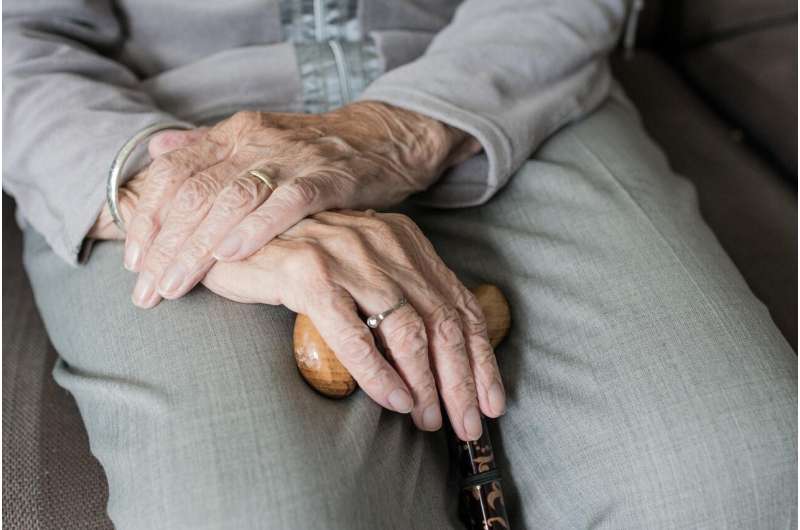
Credit: Pixabay/CC0 public domain
Older adults with symptoms of depression and moderate or severe joint pain tend to show more rapid cognitive decline, especially in the area of memory. This emerged from a study published in the news Aging and mental health.
The conclusions are based on data from 4,718 participants aged 50 and over who were followed for twelve years. The authors of the paper include researchers from the Federal University of São Carlos (UFSCar) in Brazil and University College London (UCL) in the United Kingdom.
“Both pain and symptoms of depression affect parts of the brain [mainly the hippocampus] associated with cognitive processing. Therefore, there is an overlap of information, causing the brain to become 'overloaded' and delegate certain functions to process the pain response and symptoms of depression. This would disrupt memory formation and global cognitive performance.
“In the study we saw that this overload leads to a faster cognitive decline over the years,” says Patrícia Silva Tofani, researcher in the Gerontology Program at UFSCar and professor at the Federal University of Sergipe (UFS).
The study participants are part of the English Longitudinal Study of Aging (ELSA Study), which collects multidisciplinary data from a representative sample of the UK population and is part of the International Collaboration of Longitudinal Studies of Aging (InterCoLAgeing) – an international consortium coordinated by Tiago da Silva Alexandre, professor at the Department of Gerontology of UFSCar. The study on memory loss associated with chronic pain and symptoms of depression was conducted by Tofani as part of a postdoctoral research project.
The analyzes show that people who had both conditions simultaneously (pain and depression) showed a faster decline in memory and global cognition over the twelve years of follow-up than those who had neither. On the other hand, those who had only one of the conditions did not have accelerated declines in memory and global cognition.
“This was surprising. In fact, we expected that cognitive decline would be greater in people with depressive symptoms combined with chronic joint pain than in people with just one of the conditions. But we didn't expect just the first group [pain + depression] would show a more rapid memory impairment. By following the development of this issue over twelve years, we have been able to see that the problem lies in the combination of the two circumstances,” said Alexandre.
Brain function
As the authors explain, there are at least six cognitive domains: executive function (cognitive processes involved in making decisions and planning and executing actions), language, attention, memory, perceptomotor (the detection and interpretation of sensory stimuli followed through a response in the form of movement) and social cognition (the ability to understand one's own emotions and those of others, and to interpret the behavior of others).
In the study, there was a decline in global cognition (on average six domains combined), with memory standing out – precisely because it is associated with the same brain areas affected by depressive symptoms and chronic joint pain.
Although the researchers noted a decline in memory and global cognition, they found no damage to executive function.
“This is important because memory and executive functions are the two most important domains for autonomy, that is, for the elderly, for example, to live alone,” says Tofani.
It is estimated that both depressive symptoms and joint pain are common in the elderly. As with depression, depressive symptoms – such as depressed mood, reduced energy, reduced activity and reduced ability to concentrate – are underreported. Chronic joint pain, the other condition targeted by the study, is generally associated with osteoarthritis, which is very common in the elderly.
The findings underscore the need to pay more attention to depressive symptoms and joint pain in older adults in primary care.
“It is relatively common for people to incorrectly attribute symptoms of depression and pain as normal factors of aging. And that is not the case. This belief leads professionals who are not specialists in gerontology and geriatrics to ignore the complaints of elderly people in primary care minimize and fail to diagnose and treat modifiable conditions.
“But in our research we have shown that if this is not appreciated in the consultation, it not only harms mood and mobility [in the case of pain]but also the cognitive problems of the individual,” Alexandre emphasizes.
More information:
Patrícia Silva Tofani et al., Does the coexistence of pain and depressive symptoms accelerate cognitive decline?, Aging and mental health (2024). DOI: 10.1080/13607863.2024.2392737
Quote: Joint pain associated with depressive symptoms accelerates cognitive decline in older adults, study shows (2024, November 13), retrieved November 13, 2024 from https://medicalxpress.com/news/2024-11-joint-pain-depressive-symptoms -cognitive.html
This document is copyrighted. Except for fair dealing purposes for the purpose of private study or research, no part may be reproduced without written permission. The content is provided for informational purposes only.
 Healthy Famz Healthy Family News essential tips for a healthy family. Explore practical advice to keep your family happy and healthy.
Healthy Famz Healthy Family News essential tips for a healthy family. Explore practical advice to keep your family happy and healthy.


